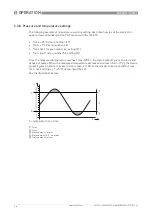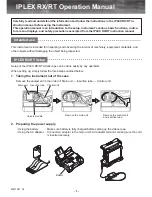
TECHNICAL DATA
8
69
WATERFLUX 3070
www.krohne.com
06/2016 - 4004999701 - MA WATERFLUX 3070 - R01 en
8.1 Measuring principle
An electrically conductive fluid flows inside an electrically insulated pipe through a magnetic
field. This magnetic field is generated by a current, flowing through a pair of field coils.
Inside of the fluid, a voltage U is generated:
U = v * k * B * D
U = v * k * B * D
U = v * k * B * D
U = v * k * B * D
in which:
v = mean flow velocity
k = factor correcting for geometry
B = magnetic field strength
D = inner diameter of flowmeter
The signal voltage U is picked off by electrodes and is proportional to the mean flow velocity v
and thus the flow rate Q. A signal converter is used to amplify the signal voltage, filter it and
convert it into signals for totalizing, recording and output processing.
Rectangular cross section
Rectangular cross section
Rectangular cross section
Rectangular cross section
The minimal height of the measuring tube decreases the distance between the field coils (1),
resulting in a stronger and more homogeneous magnetic field (2). In addition, the mean flow
velocity v increases due to the rectangular and reduced cross section. The large electrode
spacing (D) and the increased flow velocity results in a higher magnetic signal voltage, also in
the presence of a low flow rate.
Figure 8-1: Measuring principle
1
Field coils
2
Magnetic field
3
Electrodes
4
Induced voltage (proportional to flow velocity)
5
Rectangular cross section
















































